Making a difference: The Imperial students building a better future
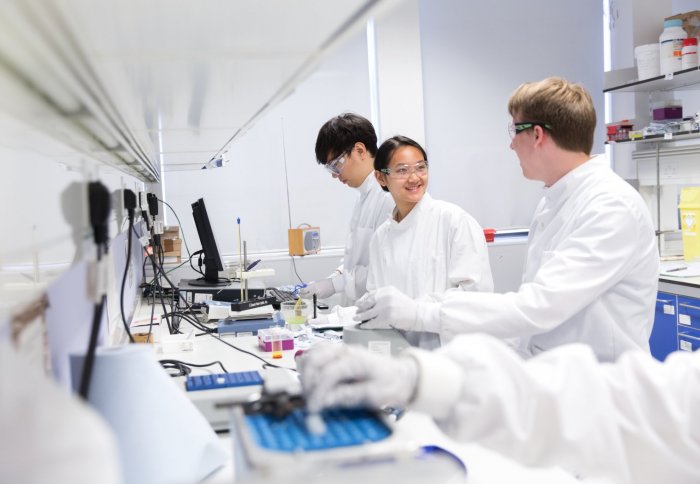
Team Debac working in the lab
Four teams of undergraduate students set up shop in Imperial labs this summer to develop technology that could bring profound benefits to society.
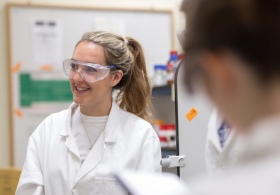 From faster disease detection to innovative recycling methods, the teams have each spent eight weeks turning their ideas into proof-of-concept prototypes as part of the Faculty of Natural Sciences Make-A-Difference competition.
From faster disease detection to innovative recycling methods, the teams have each spent eight weeks turning their ideas into proof-of-concept prototypes as part of the Faculty of Natural Sciences Make-A-Difference competition.
The FoNS-MAD competition challenges undergraduate students to develop low-cost technology with a positive social impact. Each selected team is given lab-space, funding, and guidance from academic mentors as they compete for a prize worth £1000.
Taking on a killer
Team TB Detect – Jacob Robson-Tull (Life Sciences), Bibi Wood (Life Sciences), Mark Pollock (Physics) and Federica Raguseo (Chemistry) are developing a fast, inexpensive test for tuberculosis.
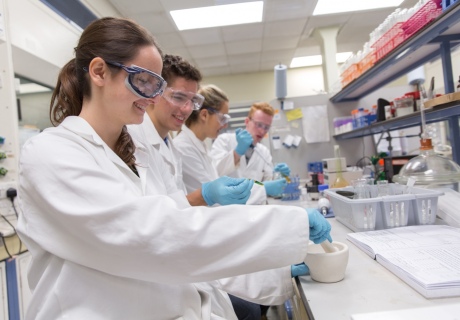
Team TB Detect
“We started by looking at the diseases that kill the most people worldwide” team member Jacob Robson-Tull said.
“Tuberculosis kills millions of people every year, especially in developing countries, despite the fact that it can be cured with antibiotics”.
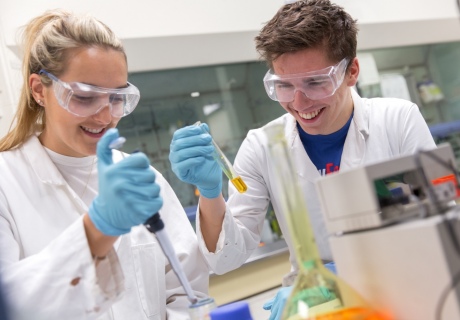
Bibi Wood and Mark Pollock
Current methods for diagnosing TB are either very expensive or slow, and require specialist knowledge or lab analysis, the team explained. This means that poorer, remote populations don’t have access to the resources needed to test for the disease quickly, leading to slower quarantining and treatment and contributing to the spread of the disease.
The team are hoping to use Molecularly Imprinted Polymers (MIPs) to create a colour-change test that is fast, cheap, and can be read easily, even without medical knowledge, fellow teammate Bibi Wood said.
Infection detection
Team Debac – made up of Thomas Caganek (Life Sciences), Mingke Pan (Life Sciences), Kim Ngan Luu Hoang (Life Sciences) as well as Gi Young Park (Physics) - are also seeking a solution to a considerable healthcare challenge. They hope to develop a new method for early detection of surgical wound infections.
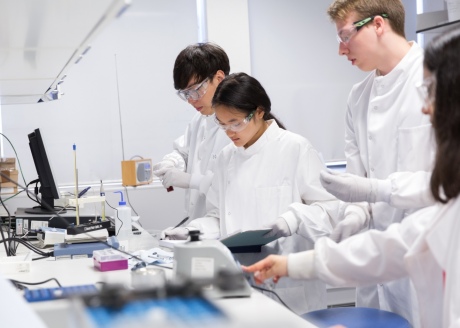
Team Debac
A surgical wound infection occurs when micro-organisms get into the part of the body that has been operated during surgery. These can then proliferate unseen beneath the skin. It is very difficult to detect surgical wound infection before symptoms show, the team explained.
Kim said: “Not only do these infections cause pain and suffering to patients, they also are associated with extended hospital stay and result in considerable financial burden to healthcare providers like the NHS”
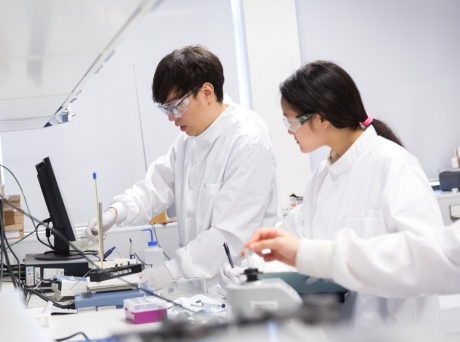
The team hope to use vesicles - tiny bubbles made out of the same material as a cell membrane - to develop a method for detecting infections in surgical wounds much earlier.
Explaining how it could work, Kim said: “Surgeons would spray vesicles containing florescent dye into the wound before closing it. If there is an infection, the vesicles would burst - releasing the dye, which would then glow beneath the skin. This would alert the patient when they come to change their bandages. They could then seek medical treatment before the infection worsens”.
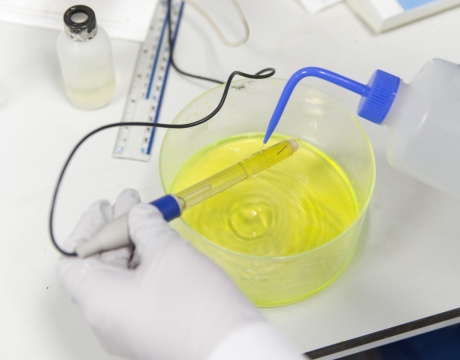
Fluorescent dye
Revolutionising recycling
Team Matoha – which includes Hans Chan (Chemistry), Martin Holicky (Chemistry), James Kung (Physics) and Anzhou Dai (Physics) – turned their attention to a key problem in the recycling industry. They are using infrared spectroscopy to develop a low-cost tool that would identify different types of plastics.
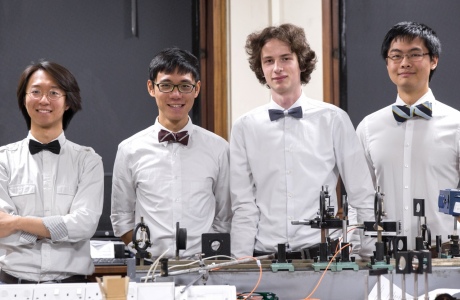
Team Matoha
“At many sorting plants, plastics are still sorted by hand because identification tools are very expensive,” James and Martin explained. “This isn’t ideal because lots of plastics look the same to the naked eye but should be recycled differently. Our tool would help plants to maximise sorting efficiency and mean that more plastic waste can be recycled, reducing the amount of plastic waste in landfills.”
Hans said: “As with any development process you never feel as though you have enough time, money or people. But this process has taught us to be resourceful, creative, and to think outside the box.”
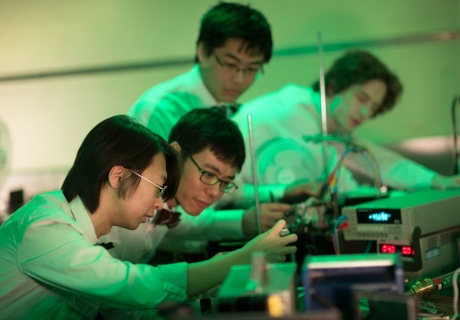
The thrifty team even resorted to making their own equipment at times: “We make the things we need ourselves where possible using laser cutting, 3d printing, or just a large hammer!” Hans added. “We’re making a low-cost product, so working to a budget keeps us in the right mind-set. Being a student definitely helps with that aspect too!”
Water from thin air
The final team, ThinAir, are working to solve the world’s water needs. They are developing an innovative biomembrane which collects water particles from the air.
Jansen Teng (Life Sciences), Muhammed (Max) Maktari (Materials), Jonathan Risley (Life Sciences), Sam Bruggen (Life Sciences), and Emily Neoh Gaik Kin (Biochemistry) have created a surface on which water rapidly condenses. Their invention aims to provide clean water to people lacking access to it, and they hope it could one day be applied large-scale over billboards or buildings to provide clean drinking water for communities.
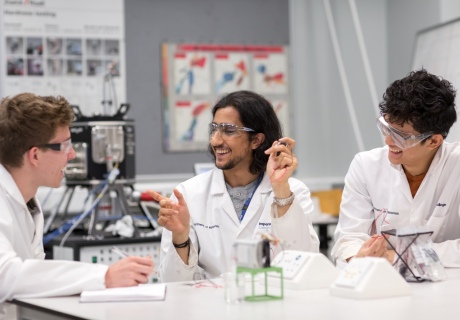
Team ThinAir
The team have already seen success with their idea – taking home the £5000 runner up prize from Imperial’s Venture Catalyst Challenge (VCC) and being crowned Student Start-Up of the Year by Enterprise Nation.
Jonathan said: “We’ve been very lucky this year and have seen incredible support for our idea. The VCC was fantastic for boosting our business acumen, but after that we decided that we needed to accelerate our lab work. The Make-A-Difference competition was a perfect opportunity to do that.”
The team’s project combines principles seen in nature with material science. Jon said: “There are lots of plants and insects that can condense water from the air. We’re taking inspiration from that and combining it with material science to maximise our membrane’s effectiveness.”
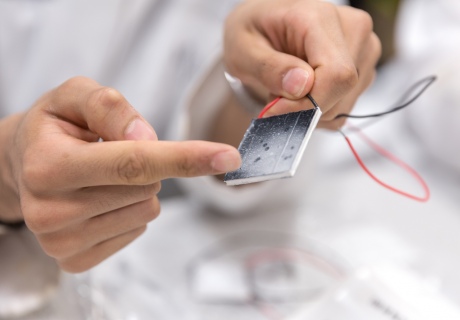
One of ThinAir's innovative membranes
The teams will pitch their ideas at the final stage of the competition on 25 October 2017.
Article text (excluding photos or graphics) © Imperial College London.
Photos and graphics subject to third party copyright used with permission or © Imperial College London.
Reporter
Deborah Evanson
Communications Division
Thomas Angus [Photographer]
Communications Division